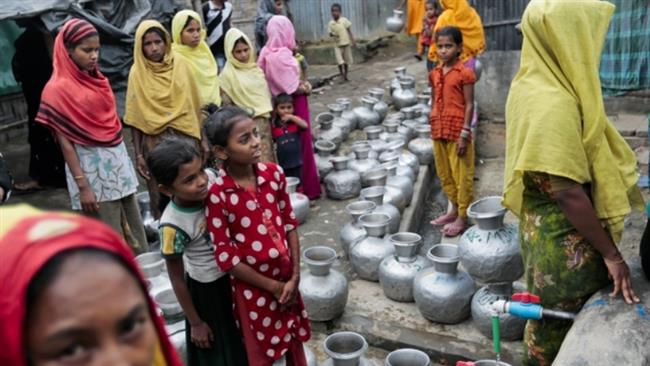
RNA - The Myanmar regime refused to grant visas to a UN team investigating the plight of Rohingya Muslims, a move that has angered human rights activists, Al Waght reported.
The teams was to investigate killings, rape and torture by security forces against Rohingya Muslims, but Myanmar claims it is conducting its own probe into the atrocities by its security forces and extremist Buddhists against the minority group.
Speaking on Wednesday, John Fisher, a Human Rights Watch representative in Geneva, said the refusal amounts to "a slap in the face of victims who suffered grave human rights violations by Myanmar's state security forces."
"Does Aung San Suu Kyi's government really want to be included in a very small and ignominious club of countries that reject Human Rights Council decisions?" he added, noting that “it would be a travesty” for Myanmar to obstruct the work of independent, international investigators.
Suu Kyi is currently the de facto leader of Myanmar as she is barred from holding the position of president under the country’s army-drafted constitution.
The north of Myanmar's Rakhine state has been under lockdown since October, when the military launched a campaign to hunt down Rohingya Muslims.
A UN report in February said the campaign against the Rohingya, who are denied citizenship and other rights in Buddhist-majority Myanmar, "very likely" amounted to war crimes.
In May, the Geneva-based rights council appointed Indira Jaising of India, Radhika Coomaraswamy of Sri Lanka and Christopher Dominic Sidoti of Australia to serve as the three members of the UN mission.
The mission was ordered to "urgently" investigate abuses reportedly committed by the security forces, particularly in Rakhine state where troops have been accused of raping, torturing and murdering members of the Rohingya community.
Rakhine State in west Myanmar has seen the most serious violence perpetrated against Muslims in predominantly Buddhist Myanmar since the military began to end its decades of strict rule. Reports indicate that thousands of Rohingya Muslims killed and hundreds of thousands displaced there in communal unrest in 2012 in what appears to be a deliberate state-backed policy of ethnic cleansing.
Myanmar's government regards the approximately one million Rohingya as illegal migrants from neighboring Bangladesh and denies them citizenship, even though Rohingya families have lived there for centuries.
The United Nations has established a fact-finding mission to investigate crimes against humanity committed by Myanmar's military during a brutal crackdown against Muslims which started last October.
According to the UN, the Rohingya Muslims are one of the most persecuted minorities in the world.
847/940